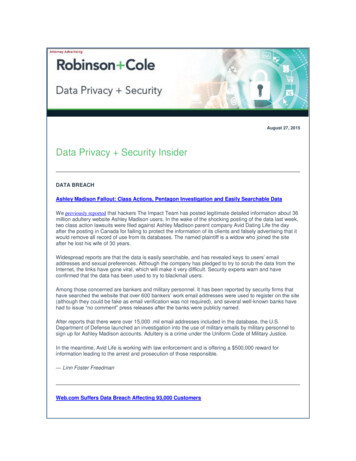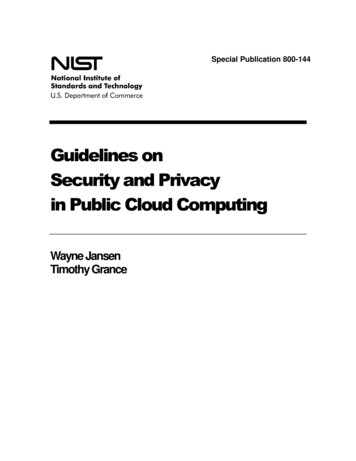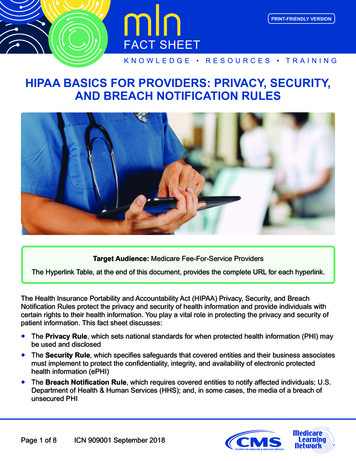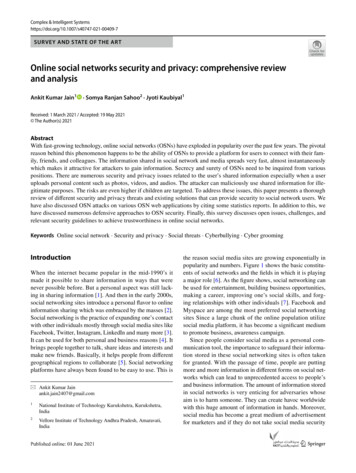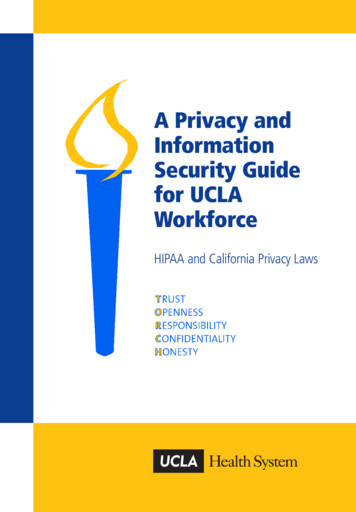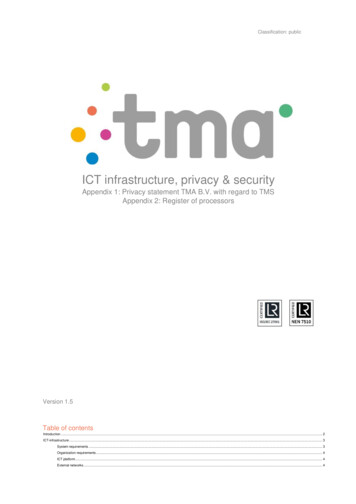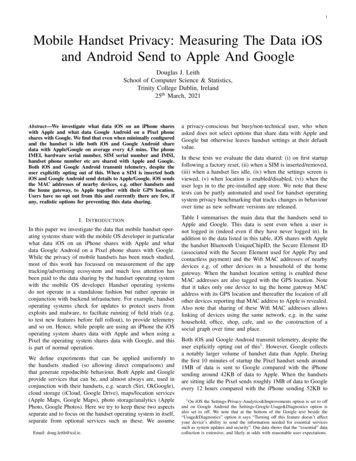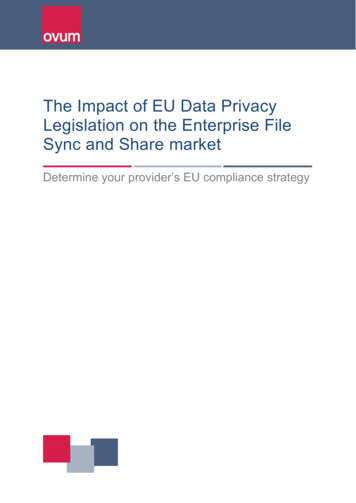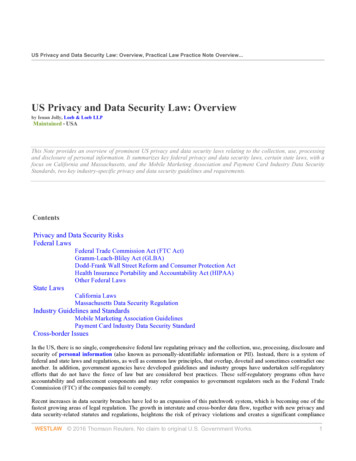
Transcription
US Privacy and Data Security Law: Overview, Practical Law Practice Note Overview.US Privacy and Data Security Law: Overviewby Ieuan Jolly, Loeb & Loeb LLPMaintained USAThis Note provides an overview of prominent US privacy and data security laws relating to the collection, use, processingand disclosure of personal information. It summarizes key federal privacy and data security laws, certain state laws, with afocus on California and Massachusetts, and the Mobile Marketing Association and Payment Card Industry Data SecurityStandards, two key industry-specific privacy and data security guidelines and requirements.ContentsPrivacy and Data Security RisksFederal LawsFederal Trade Commission Act (FTC Act)Gramm-Leach-Bliley Act (GLBA)Dodd-Frank Wall Street Reform and Consumer Protection ActHealth Insurance Portability and Accountability Act (HIPAA)Other Federal LawsState LawsCalifornia LawsMassachusetts Data Security RegulationIndustry Guidelines and StandardsMobile Marketing Association GuidelinesPayment Card Industry Data Security StandardCross-border IssuesIn the US, there is no single, comprehensive federal law regulating privacy and the collection, use, processing, disclosure andsecurity of personal information (also known as personally-identifiable information or PII). Instead, there is a system offederal and state laws and regulations, as well as common law principles, that overlap, dovetail and sometimes contradict oneanother. In addition, government agencies have developed guidelines and industry groups have undertaken self-regulatoryefforts that do not have the force of law but are considered best practices. These self-regulatory programs often haveaccountability and enforcement components and may refer companies to government regulators such as the Federal TradeCommission (FTC) if the companies fail to comply.Recent increases in data security breaches have led to an expansion of this patchwork system, which is becoming one of thefastest growing areas of legal regulation. The growth in interstate and cross-border data flow, together with new privacy anddata security-related statutes and regulations, heightens the risk of privacy violations and creates a significant compliance 2016 Thomson Reuters. No claim to original U.S. Government Works.1
US Privacy and Data Security Law: Overview, Practical Law Practice Note Overview.challenge.In light of these developments, this Note provides an overview of certain key privacy and data security laws. In particular, theNote looks at: The consequences of failing to comply with privacy and data security laws.The key federal laws in this area, with an explanation of the entities and data covered by the law, the obligations andrequirements under the legislation and potential sanctions and liability.Certain state laws in California and Massachusetts, where rigorous privacy and data security laws have been adopted.Industry guidelines and standards.Privacy and Data Security RisksFailure to comply with privacy and data security laws can result in significant adverse consequences, including: Government-imposed civil and criminal sanctions, including fines and penalties.Significant fines and damages awards resulting from private lawsuits, including class actions (permitted under someprivacy and data security laws).Damage to the company’s reputation and customers’ confidence and trust, resulting in lost sales, market share andbrand and stockholder value.The adverse consequences of failing to safeguard personal information can be serious, as the following examplesdemonstrate: Target Corporation. In the largest data breach to ever affect a retailer, Target announced in late 2013 that it wasaffected by a breach that may have resulted in the disclosure of the payment card information of over 40 millionconsumers and the personal information of an additional 70 million consumers. To date, Target has been sued byconsumers and shareholders in over 70 lawsuits in addition to being the subject of multiple regulatory investigations.TJX Companies, Inc. One of the largest data security breaches in the US cost TJX Companies, Inc., the parentcompany of several retailers including TJ Maxx and Marshalls, at least 256 million and perhaps up to 500 million.The company discovered in December 2006 that credit and debit card numbers of more than 45 million consumerswere stolen and used to make purchases and open fictitious accounts. The company settled several class action lawsuitsfiled by consumers, as well as lawsuits filed by credit card companies and banks that had to reissue millions of cards.Heartland Payment Systems, Inc. In January 2009, Heartland Payment Systems, Inc., which provides bank cardpayment processing services to merchants, announced that hackers had broken into its systems and stolen payment carddata. In possibly the largest data breach involving payment cards, an estimated 130 million credit and debit cardnumbers were stolen.Federal LawsThere are many federal laws that regulate privacy and the collection, use, processing and disclosure of personal information,including: Broad federal consumer protection laws, such as the Federal Trade Commission Act (FTC Act), that are notspecifically privacy and data security laws, but are used to prohibit unfair or deceptive practices involving thecollection, use, processing, protection and disclosure of personal information.Laws that apply to particular sectors, such as the: Gramm-Leach-Bliley Act (GLBA), which applies to financial institutions; and Health Insurance Portability and Accountability Act (HIPAA), which applies to medical information.Laws that apply to types of activities that use personal information or might otherwise affect individual privacy, such asthe: 2016 Thomson Reuters. No claim to original U.S. Government Works.2
US Privacy and Data Security Law: Overview, Practical Law Practice Note Overview. Telephone Consumer Protection Act for telemarketing activities; and Controlling the Assault of Non-Solicited Pornography and Marketing (CAN-SPAM) Act for commercial email.In addition, there are many federal security and law enforcement laws that regulate the use of personal information such asthe Uniting and Strengthening America by Providing Appropriate Tools Required to Intercept and Obstruct Terrorism Act of2001 (USA Patriot Act), and federal and state wiretapping laws, but a discussion of these laws is outside the scope of thisNote.This section examines the following key federal privacy laws in more detail: FTC Act (regulating unfair or deceptive commercial practices).Gramm-Leach-Bliley Act (GLBA) also known as the Financial Services Modernization Act of 1999 (regulatingpersonal information collected or held by financial institutions).Federal Trade Commission’s “Red Flags” Rules issued under the Fair and Accurate Credit Transactions Act(FACTA) (requiring financial institutions and creditors to have written information security programs).HIPAA, as amended by the Health Information Technology for Economic and Clinical Health Act (HITECH)(regulating protected health information (PHI)).Certain other prominent federal laws: Children’s Online Privacy Protection Act (COPPA) (regulating the online collection of information fromchildren); Fair Credit Reporting Act (FCRA), as amended by FACTA (regulating consumer credit and other information); CAN-SPAM (regulating commercial e-mail); Telephone Consumer Protection Act (TCPA) (regulating telemarketing); Electronic Communications Privacy Act (ECPA) (regulating electronic communications); and Computer Fraud and Abuse Act (CFAA) (regulating computer tampering).Federal Trade Commission Act (FTC Act)The FTC Act is a federal consumer protection law that prohibits unfair or deceptive commercial practices and has beenapplied to business practices that affect consumer privacy and data security. The FTC is active in this area and bringsenforcement actions against companies, including for: Failing to comply with statements made in their posted privacy policies.Making material changes to their privacy policies without adequate notice to consumers.Failing to provide reasonable and appropriate protections for sensitive consumer information held by them.The FTC also issues guidelines relating to privacy and data security that are not legally binding but are considered bestpractices. For example, in March 2012, the FTC issued its final report on consumer privacy protection with recommendationsfor best privacy practices for companies (see Protecting Consumer Privacy in an Era of Rapid Change). In 2009, the FTCissued revised Self-Regulatory Principles for Behavioral Advertising (Behavioral Advertising Principles), which set out nonbinding guidelines for conducting behavioral advertising (meaning the tracking of an individual’s online activities to delivertailored advertising). The self-regulatory program was expaned in 2015 to the mobile environment.Entities Subject to the FTC ActThe FTC Act and related FTC-issued rules and guidelines apply to most companies and individuals doing business in the US,other than certain transportation, telecommunications and financial companies that are primarily regulated by other nationalagencies. 2016 Thomson Reuters. No claim to original U.S. Government Works.3
US Privacy and Data Security Law: Overview, Practical Law Practice Note Overview.The Behavioral Advertising Principles apply to website operators that engage in behavioral advertising (also calledcontextual advertising and targeted advertising). Compliance with these principles is voluntary, although many companiesadopt them as best practices.Regulated DataThe FTC Act does not regulate specific categories of personal information. Instead, it prohibits unfair or deceptive acts orpractices that affect consumers’ personal information.The Behavioral Advertising Principles apply to entities that track a consumer’s online activity to deliver advertising targetedto the consumer’s interests.The Behavioral Advertising Principles apply to data that “could reasonably be associated with a particular consumer orcomputer or other device” and so is not limited to a more narrow definition of personal information (which is commonlydefined as information that can be linked to a specific individual, including but not limited to an individual’s name, address,e-mail, Social Security number or driver’s license number).General ObligationsThe FTC Act prohibits unfair or deceptive acts or practices. Through broad application of its authority under the Act, theFTC has emerged as the principal federal regulator for privacy and data security.The FTC has used its authority under the FTC Act to charge companies that: Fail to comply with statements made in their posted website privacy policies.Make material changes to their privacy policies without adequate notice to consumers.Fail to provide reasonable and appropriate protections for personal information held by them.Notice and Disclosure RequirementsThe FTC Act does not expressly require a company to have or disclose a privacy policy. The FTC has taken the position,however, that: If a company discloses a privacy policy, it must comply with it.It is a violation of the FTC Act for a company to retroactively make material changes to its privacy policy withoutproviding consumers with notice of those changes and the opportunity to opt out of the new privacy policy.The FTC also enforces COPPA (see Children’s Online Privacy Protection Act (COPPA)), which requires websites that aredirected to children, or that knowingly collect personal information from children, to provide a privacy policy.The FTC’s Behavioral Advertising Principles suggest that website operators engaging in behavioral advertising: Disclose to consumers their data collection practices tied to online behavioral advertising.Disclose that consumers can opt out of (that is, say “no”) these practices.Provide a mechanism to the consumer for opting out (for example, by allowing the consumer to electronically check abox indicating that the consumer is opting out or by sending an e-mail to the operator).Consent Requirements 2016 Thomson Reuters. No claim to original U.S. Government Works.4
US Privacy and Data Security Law: Overview, Practical Law Practice Note Overview.Although the FTC Act does not expressly address consent, website operators that revise their privacy policies should obtainaffirmative express consent (that is, allow consumers to opt-in) before using their data in ways that are materially differentfrom the privacy policy that was in effect when the data was collected.The FTC also enforces COPPA (see Children’s Online Privacy Protection Act (COPPA)), which requires websites that aredirected to children, or that knowingly collect personal information from children, to obtain “verifiable parental consent”before collecting, using or sharing children’s personal information.The FTC’s Behavioral Advertising Principles suggest that website operators obtain affirmative express consent (which can beprovided online) from consumers before collecting or using sensitive consumer data in connection with online behavioraladvertising. Under the Behavioral Advertising Principles, sensitive data includes (but is not limited to): Financial data.Data about children.Health information.Precise geographic location information.Social Security numbers.Individual Access to Collected Data and Right to Correct or Delete DataGenerally, the FTC Act and most US federal and state privacy laws, with some notable exceptions, including HIPAA (seeHealth Insurance Portability and Accountability Act (HIPAA)) and some California laws (see California Laws), do notprovide individuals with specific rights to access or correct their personal information.However, COPPA (see Children’s Online Privacy Protection Act (COPPA)), is enforced by the FTC and requires thatwebsite operators allow parents to: View the personal information collected by a website about their child.Delete and correct that information.In addition, the White House’s 2012 Privacy Report and Consumer Privacy Bill of Rights (which will be the bases for newvoluntary codes of conduct) state that, “companies also should provide consumers with reasonable access to personal datathat they collect or maintain about them, as well as the appropriate means and opportunity to correct inaccurate data orrequest its deletion or use limitation.”Data Security RequirementsWhile the FTC Act does not specifically address data security, the FTC has brought enforcement actions alleging that thefailure to take reasonable and appropriate steps to protect personal information is an “unfair act or practice” in violation ofthe FTC Act. For example, the FTC has found violations of the FTC Act where a company: Failed to encrypt information while it was in transit or stored on the network.Stored personally identifiable information in a file format that permitted anonymous access.Did not use readily accessible security measures to limit access.Failed to employ sufficient measures to detect unauthorized access or conduct security investigations.Created unnecessary business risks by storing information after it had any use for the information, in violation of bankrules.(See In the Matter of BJ’s Wholesale Club, Inc. 140 FTC 465 (FTC Consent Order, Sept. 20, 2005).)The FTC has taken the position in enforcement actions that inadequate data security practices can form the basis for a claim 2016 Thomson Reuters. No claim to original U.S. Government Works.5
US Privacy and Data Security Law: Overview, Practical Law Practice Note Overview.of deceptive practices under the FTC Act where a privacy policy states that the business had implemented reasonable andappropriate security measures, see Federal Trade Commission v. Wyndham Worldwide Corporation, et al. 2:13-cv-01887,D.N.J. (2012).The FTC’s Behavioral Advertising Principles suggest that website operators that collect or store consumer data for behavioraladvertising purposes should: Provide reasonable security for that data.Retain data for only the time necessary to fulfill a legitimate business or law enforcement need.The Behavioral Advertising Principles provide that extent and type of protections given to consumer data should be based onthe: Sensitivity of the data.Nature of the company’s business operations.Types of risk a company faces.Reasonable protections available to a company.Restrictions on Sharing Data with Third PartiesWhile the FTC Act does not expressly prohibit the sharing of personal information with third parties, the FTC’s position isthat, if a company discloses a privacy policy (which may include statements regarding the company’s information sharingpractices), it must comply with it. This includes situations where the privacy policy states that the company will not rent, sellor otherwise disclose personal information to third parties. The FTC may also bring enforcement actions against companiesthat have unfair or deceptive information sharing practices, even if these companies did not disclose a privacy policy or havenot violated their disclosed privacy policies.Important ExemptionsThe privacy rules and guidelines issued by the FTC provide exemptions from privacy requirements for law enforcementpurposes.EnforcementThe FTC is the primary enforcer of the FTC Act (as well as other federal privacy laws, including COPPA, FCRA andFACTA). Actions the FTC can take include: Starting an investigation.Issuing a cease and desist order.Filing a complaint in court.The FTC also reports to Congress on privacy issues and recommends the enactment of required privacy legislation.Sanctions and Other LiabilityThe FTC Act provides penalties of up to 40,000 per offense (increase from 16,000 effective as of Aug. 1, 2016). Criminal 2016 Thomson Reuters. No claim to original U.S. Government Works.6
US Privacy and Data Security Law: Overview, Practical Law Practice Note Overview.penalties include imprisonment for up to ten years. The FTC can also: Obtain injunctions.Provide restitution to consumers.Require repayment of investigation and prosecution costs.Settlements with the FTC and other government agencies also often provide for onerous reporting requirements, audits andmonitoring by third parties.Notable examples of FTC enforcement actions include: In 2015, Nomi Technologies, a company that tracked consumers’ physical locations in stores, agreed to settle FTCcharges that it failed to provide an in-store mechanism for opting out of the tracking and failed to tell consumers whenthey were being tracked in stores.In 2015, two data brokers settled FTC charges that they posted unencrypted spreadsheets on the Internet containingconsumers’ bank account and credit card numbers, birth dates, contact information, employers’ names and informationabout debts the consumers allegedly owed.In 2014, Snapchat, a popular social media messaging platform and mobile app, and the FTC announced a settlement ofcharges that Snapchat allegedly collected geolocation data despite a privacy policy to the contrary, collected users’contacts information from their address books without notice or permission, and failed to protect users’ data which ledto the hacking of 4.6 million user accounts.In 2009, CVS Caremark, operator of the largest pharmacy chain in the US, agreed to pay 2.25 million to settle chargesbrought by the FTC and the Department of Health and Human Services (HHS) for violating consumer and medicalprivacy laws.In 2008, TJX, Inc., the parent company of several major retailers, in settling charges of failing to adequately protectcustomers’ credit card numbers (see Privacy and Data Security Risks), agreed to allow comprehensive audits of its datasecurity system for 20 years.In 2006, ChoicePoint, a database owner and data broker, agreed to pay 15 million to settle charges filed by the FTCfor failing to adequately protect the data of millions of consumers.Gramm-Leach-Bliley Act (GLBA)The privacy and data security provisions of GLBA (also referred to as the Financial Modernization Act) regulate thecollection, use, protection and disclosure of non-public personal information by financial institutions.Entities Subject to GLBAGLBA applies to: ”Financial institutions,” which is broadly defined to include any institution engaging in “financial activities,” including,but not limited to: banks; securities firms; insurance companies; other businesses that may not traditionally be thought of as financial institutions but provide financial services andproducts, such as: mortgage lenders or brokers; credit counseling services and other financial advisors; collection agencies; and retailers that issue their own credit cards. 2016 Thomson Reuters. No claim to original U.S. Government Works.7
US Privacy and Data Security Law: Overview, Practical Law Practice Note Overview. According to the FTC, an institution must be “significantly engaged” in financial activities to be considered a financialinstitution. Whether a financial institution is significantly engaged in financial activities is a flexible standard that takesinto account all of the facts and circumstances.Affiliated and unaffiliated third parties that receive non-public personal information from financial institutions.Persons who obtain or attempt to obtain non-public personal information from financial institutions through false orfraudulent means.Regulated DataGLBA applies to non-public personal information collected by a financial institution that is provided by, results from or isotherwise obtained in connection with consumers and customers who obtain financial products or services primarily forpersonal, family or household purposes from a financial institution.Non-public personal information under GLBA generally is any “personally identifiable financial information” that is: Not publicly available.Capable of personally identifying a consumer or customer.”Consumers” are individuals who have obtained a financial product or service but do not necessarily have an ongoingrelationship with the financial institution (for example, someone who cashed a check with a check-cashing company or madea wire transfer or applied for a loan).”Customers” are a subset of consumers and refers to anyone with an ongoing relationship with the institution.General ObligationsGLBA regulates the collection, use, protection and disclosure of non-public, personal information. GLBA requires thatfinancial institutions: Notify their customers about their information-sharing practices and provide customers with a right to opt out if they donot want their information shared with certain unaffiliated third parties (GLBA Financial Privacy Rule).Implement a written security program to protect non-public personal information from unauthorized disclosure (GLBASafeguards Rule).In addition, any entity that receives consumer financial information from a financial institution may be restricted in its reuseand re-disclosure of that information.Notice and Disclosure RequirementsGLBA requires a financial institution to provide notice of its privacy practices, but the timing and content of this noticedepends on whether the subject of the data is a consumer or a customer: A customer is entitled to receive the financial institution’s privacy notice both: when the relationship is created; and annually thereafter.A consumer is entitled to receive the financial institution’s privacy notice if the financial institution intends to share theconsumer’s non-public personal information.The privacy notice must be a clear, conspicuous and accurate statement of the financial institution’s privacy practices. Itshould describe: 2016 Thomson Reuters. No claim to original U.S. Government Works.8
US Privacy and Data Security Law: Overview, Practical Law Practice Note Overview. The categories of information that the financial institution collects and discloses.The categories of affiliated and non-affiliated entities with which it shares information.That the consumer or customer has the right to opt out of some disclosures.How the consumer or customer can opt out (if an opt-out right is available).In 2009, the FTC (along with the other federal regulatory bank agencies responsible for enforcing GLBA) issued a formmodel privacy notice. Although financial institutions are not required to use the form, those that do will obtain a “safeharbor” and satisfy the GLBA disclosure requirements for privacy notices. The final rule and form are available from theFTC.Consent RequirementsAlthough GLBA does not require any affirmative consent from a customer or consumer, GLBA does require a financialinstitution, at the time of setting up a customer relationship and at least annually thereafter, to: Notify customers and consumers of the institution’s privacy policy and practices.Provide the individual with “reasonable means” to opt out of certain uses and disclosures of the individual’s non-publicpersonal information. The means can be written, oral or electronic.Under GLBA, a financial institution does not need to provide an opt-out right to: Share non-public personal information for the purpose of administering or enforcing a transaction that a customerrequests or authorizes.Share non-public personal information with outside companies that provide essential services, such as data processingor servicing accounts, if certain conditions are met (such as contractually binding the outside company to protect theconfidentiality and security of the data).Individual Access to Collected DataGLBA allows consumers or customers to opt out of certain disclosures, but generally does not provide affirmative accessrights to these individuals.Restrictions on Disclosing Personal Information to Third PartiesRestrictions under GLBA on disclosing personal information to third parties depends on whether the third party is an affiliateor unaffiliated third party: Disclosures to affiliates. A financial institution can disclose a consumer’s non-public personal information to anaffiliated entity if it provides notice of this practice. The financial institution does not need to obtain affirmativeconsent or provide an opt-out right for this disclosure. An affiliated entity is “any company that controls, or iscontrolled by, or is under common control with another company” and includes both financial and non-financialinstitutions.Disclosures to unaffiliated third parties. Generally, a financial institution must provide notice and a right to opt outof disclosures of personal information to unaffiliated parties. However, a financial institution can disclose anindividual’s non-public personal information with an unaffiliated entity, without allowing the individual to opt out, ifall of the following conditions are met: the disclosure is to a third party that uses the information to perform services for the financial institution; 2016 Thomson Reuters. No claim to original U.S. Government Works.9
US Privacy and Data Security Law: Overview, Practical Law Practice Note Overview. the financial institution provides notice of this practice to the individual before sharing the information; and the financial institution and the third party enter into a contract that requires the third party to maintain theconfidentiality of the information and to use the information only for the prescribed purposes.Financial institutions may also disclose personal information to unaffiliated third parties without providing an opt-out rightunder certain circumstances, including where the disclosure is: ”Necessary to effect, administer or enforce a transaction” or made with the customer’s consent.For compliance purposes (for example, to an insurance rating organization or credit reporting agency).For law enforcement purposes.Data Security RequirementsThe GLBA Safeguards Rule requires companies to develop a written information security plan that describes their programto protect customer information. The plan must be appropriate to the company’s size and complexity, the nature and scope ofits activities and the sensitivity of the customer information it handles. As part of its plan, each company must: Designate one or more employees to coordinate its information security program.Identify and assess the risks to customer information in each relevant area of the company’s operation and evaluate theeffectiveness of the current safeguards for controlling these risks.Implement an identity theft prevention program in connection with “covered accounts.”Implement regulations requiring the financial institutions to notify the regulator (and in certain cases the customer)when there has been unauthorized access to “sensitive customer information.”Select service providers that are able to maintain appropriate safeguards, contractually require service providers tomaintain safeguards and oversee service providers’ handling of customer information.Evaluate and adjust the program in light of relevant circumstances, including changes in the firm’s business oroperations or the results of security testing and monitoring.The requirements are designed to be flexible. According to the FTC, companies should implement safeguards appropriate totheir own circumstances.Data Breach Notification RequirementsGLBA does not include an explicit data breach notification requirement. However, several of the federal bank regulatoryagencies (such as the Office of the Comptroller of the Currency and the Federal Reserve Board) have implementedregulations requiring financial institutions subject to their authority to notify the regulator (and in some cases the customer)when there has been an unauthorized access to “sensitive customer information.”Sensitive customer information generally includes a customer’s name, address or telephone number combined with one ormore of the following items of information abo
The FTC Act is a federal consumer protection law that prohibits unfair or deceptive commercial practices and has been applied to business practices that affect consumer privacy and data security. The FT
